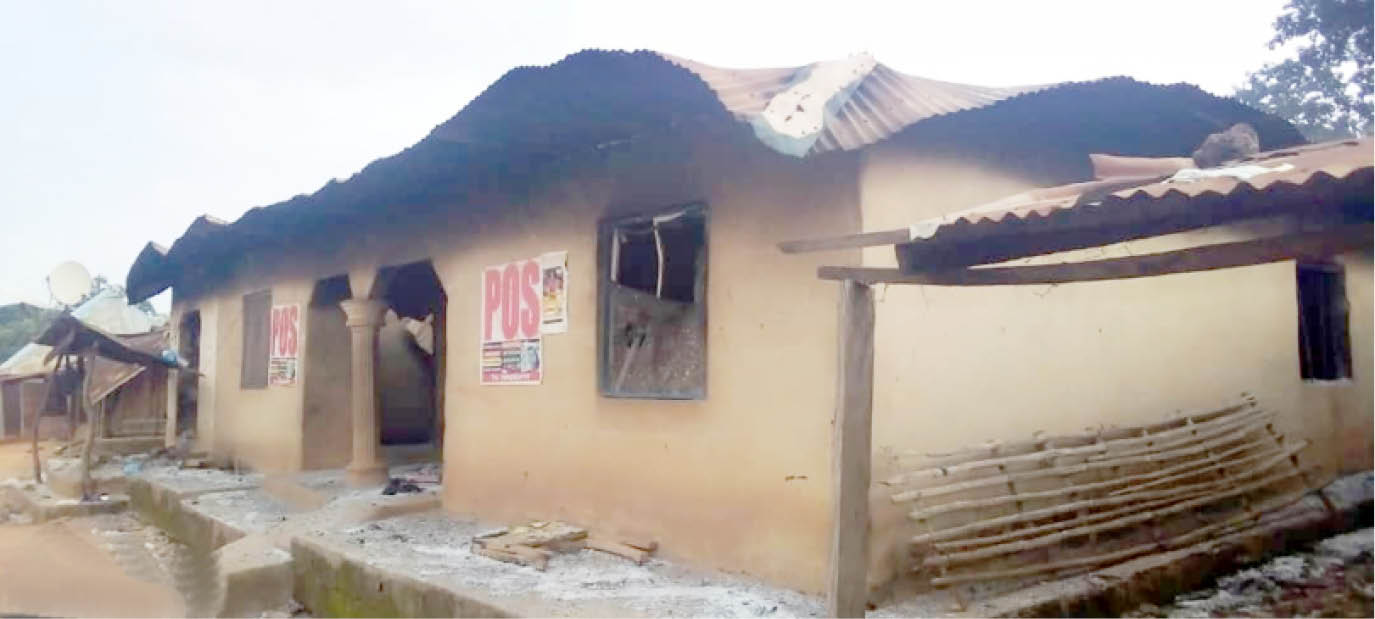For many years, the people of Agatu in Benue State have continued to suffer the misfortune of crises, which have claimed many lives and impacted negatively on the socio-economic life of inhabitants.
The area had not only been bedevilled by the herders-farmers crisis but incessant communal clashes, which seem to have defied solutions.
- States differ over Buhari’s grazing routes directive
- After long silence, South East leaders condemn secessionist threats
Daily Trust on Sunday reports that the latest of the crises was the killing of 11 people in two separate incidents in Agatu Local Government Area, barely one week after gunmen attacked and killed 27 people in the Odugbeho community on June 7, 2021.
The fresh killings had occurred in Odugbeho and two other rural villages of Aila and Adagbo. While two people were said to have been killed in Odugbeho, the remaining nine persons were killed in Aila and Adagbo villages on Sunday night.
The chairman of Agatu Local Government, Adoyi Sule, told our correspondent on the telephone that the attack on Odugbeho community, which led to the death of two persons, was carried out by suspected armed herders, who burnt 21 houses.
He, however, disclosed that the other nine deaths were recorded as a result of a communal crisis between Aila and Adagbo communities, adding that eight people who were wounded were being treated in a hospital.
A victim of the crisis, 68-year-old Joseph Oyaju from Adagbo community, who lost his son to the latest crisis on a Sunday night, said it had been difficult to cope with the reality of the death of his child.
He narrated that his late son, Imanche Joseph, 27, was at his barbing salon shop that fateful day when suddenly, the attackers invaded the village about 7:45 pm and shot him dead.
“My son was barbing a customer’s hair when his assailants shot him dead in his shop. Other people were also killed in our village that night. It has been difficult for me to cope since we buried him.
“The atmosphere appears calm now, but there is panic among residents. We cannot predict what would happen tomorrow or next, so we appeal to security operatives to be stationed in Adagbo to forestall further attacks,” the bereaved father said.
A youth leader from Adagbo, Simon Seidu, told our correspondent that it was the first time in the history of Idoma land that a village would come under attack for providing shelter for displaced people from other communities.
He said his community never had any issue with neighbouring communities and that was why the attack of July 14, 2021, was a surprise to them as it happened unexpectedly.
Seidu recalled that the last time Abugbe and Agbaduma people had a crisis, some residents relocated to Adagbo for safety, stressing that people from Abugbe were not happy that his community allowed displaced persons to take refuge.
“Four communities — Abugbe, Egba, Akwu and Odugbeho — ganged up and attacked our people. Odugbeho had alleged that our people colluded with armed herders to carry out the killing of the people in their village. We don’t even have boundaries with Odugbeho because they are far from us,” Seidu narrated.
He said the people of Adagbo had lived peacefully with their neighbours for quite a long time.
The youth leader is worried that at the moment, no one in his area can go to farms for fear of being killed, especially as there is no security presence to protect them.
“The army came that day the attack happened. They saw the dead bodies and took away the injured to the hospital. At the moment, the general atmosphere is still tense because the people are afraid,” Seidu said.
Some other people from the crisis-ridden communities, who spoke on condition of anonymity, said the Agatu communal clashes had remained complex as there are traditional, political and external forces fueling the crises.
A youth leader of Aila, Aboje Joseph, however, explained that his community, which falls within the nine clans to include Agbaduma, had in the past three years, suffered from a traditional rulership dispute, adding that his people were killed severally without retaliation.
He said the latest crisis was triggered by farmland after an agreement had been reached during several peace meetings for the communities to stick to the portions approved for them by local authorities.
He further explained that the land in dispute was a FADAMA area, alleging that the Abugbe/Egba people continued to deprive them, who are of the large clan, of farming.
Joseph alleged that the latest trouble emanated from Abugbe people who left Aila when the crisis broke out to take refuge elsewhere, adding that they are in the habit of invading their community occasionally to kill people.
The youth leader decried the negative impact of the crisis on the economy of the once peaceful communities of Agatu, as he sued for peace.
“I am in Aila as we speak now, but homes are deserted, leaving only a few of us. I can tell you that there are gunshots right now and the situation is not yet balanced. The people are afraid and cannot yet return home.
“As it is, only God will help us for peace to return to our land again,” Joseph said.
According to the vice-chairman of Agatu, John Ikwulono, the people are feeling bad and demoralized, while families who lost their loved ones are in a state of dilemma, especially as their breadwinners were killed.
He said over 50 lives were lost within two weeks of the renewed crisis, while houses and other property worth millions of naira were destroyed.
Ikwulono said, “People now hardly go to farms, market and worship centres. Even if they do, they do so with the fear of the unknown.”
Meanwhile, a source who didn’t want his name in print told our correspondent that the latest attack happened between 7:30 pm and 8 pm on Sunday. He alleged that Aila people attacked Omikwudi community in the afternoon of that Sunday but nobody was killed because their youths were on the ground to resist the invaders. Later that same day, by 8 pm, according to him, Adagbo was attacked and four indigenes were killed. Four Aila people were also killed. A man who was simply identified as Michael, who hailed from Ashaba village but worked in Adagbo, also fell victim of the attack, bringing the total number of those killed to nine.
“Notably, Ayila, Adagbo, Okokolo, Odejo, amongst others, are from one of the rival clans called Agbaduma. They are the majority, while Abugbe, the minority clan has supporters from other minority clans and communities, such as Akwu, Egba, Abugbe Odugbeho and others on the other side of the crisis, called Abugbe clan.
“It was the Omikwudi attack that provoked the other minorities to strike back at Adagbo, who were allegedly hiding Ayila youths that earlier attacked their perceived enemy,” our source alleged.
He further noted that Okokolo community, which belongs to the Agbaduma clan, usually got sympathy and support from another major clan of Agatu, which is the Adogoji, majorly made up of Obagaji people.

“It is believed that the people of Abugbe still host armed herders in their community and using them to fight the giant clans, in addition to the sympathy they draw from other smaller communities, who also don’t like the Och’Agatu (traditional head).
“It was the disagreement over the kingship of this present Och’Agatu that started this fight. They allegedly bribed people to vote for him, against the original rotation. The alleged gift to each of the voting chiefs, which some did not collect, brought about factions and hatred.
“There was also the allegation that some of the big chiefs collected money from herders before now for a land space. That is why the armed herders hardly attack other smaller clans who refused to send them out and have continued to attack Okokolo and their allies,” he alleged.
In May 2019, the Agatu crisis manifested between the Abugbe and Okokolo people when, in a frightening dimension, 25 villagers were hacked to death on a Sunday evening over lingering disagreements on ownership of fishing ponds and farming land.
A member of the peace committee constituted by the state government and former lawmaker who represented Agatu at the state House of Assembly, Alhaji Sule Audu, said the crisis had lingered in the communities because of the spirit of vengeance.
He said, “Our people have refused to forgive and allow the past to go. Our internal issues have accumulated reactions on any slight provocation. That’s where we think religious leaders should come in.
“Agatu west, where you have more Muslim population, are peaceful, but not so with Agatu south, where there’s at least 80 per cent Christian population.”
The ex-lawmaker, who is now a principal special assistant to the Benue State governor on investment, mentioned the two council wards of Egba and Okokolo in Agatu Local Government Area as the centre of crisis.
He alleged that some of the clans from the two warring council wards resorted to hiring external forces to settle their scores.
According to him, the issues revolved around age-long farmlands, fishing ponds, and recently, chieftaincy matters. He noted that the people lived peacefully among themselves until in 2016 when the chieftaincy law of the state was amended.
Audu said it was the struggle between Abugbe and Okololo to first hold the newly created stool of a village head, which hitherto did not exist until the amended law, that made things to fall apart amongst them.
The former lawmaker, however, maintained that the issues surrounding the chieftaincy stool had been resolved while the state government took over ownership of the disputed fish pond, wondering why the people continued to antagonise one another.
Severally, the state deputy governor, Engr Benson Abounu, who heads the peace committee, initiated talks amongst the aggrieved people in the affected areas, but after a while, the warring factions would renege on their agreement to end the dispute.
A concerned indigene of the area who did not want his name on print, lamented the sociopolitical and economic effects of the clash on the villagers, saying the communal clashes has resulted to retrogression.
“Unfortunately, there is no unity any longer. Most of the villages involved are currently deserted. For fear of being killed by their enemies, there’s no farming activity by the villagers. No business activities, no school, no sporting activity. And the usual funfair characteristic of most Agatu villages is no more. There is no love.
“The people, most especially the youths, are radicalised and can kill at any slightest provocation. There is an increase in criminality. Now, victims are left with feelings of trauma, state of hopelessness, confusion, abandonment and fear of being killed anytime.
“The people have also lost confidence in our security personnel as they don’t respond swiftly until after attacks are successfully carried out. The clashes are still lingering on, even though it subsides sometimes.
“The people have concluded that there will not be an end to clashes soon and have decided to live the lives of people living in war-ravaged areas. Some will escape to carry out their farm activities and rush home. Some are killed in their farms. Some go to their farms with weapons in case of any eventuality. Some have even concluded that they are ready for death and will no longer run from their ancestral homes.
The police public relations officer in the state, DSP Catherine Anene, was yet to respond to enquiries by our correspondent as at the time of filing this report.
However, a military personnel who was not authorised to speak to journalists, told our correspondent that troops of Operation Whirl Stroke (OPWS) had been deployed to the affected areas to restore sanity.

 Join Daily Trust WhatsApp Community For Quick Access To News and Happenings Around You.
Join Daily Trust WhatsApp Community For Quick Access To News and Happenings Around You.


